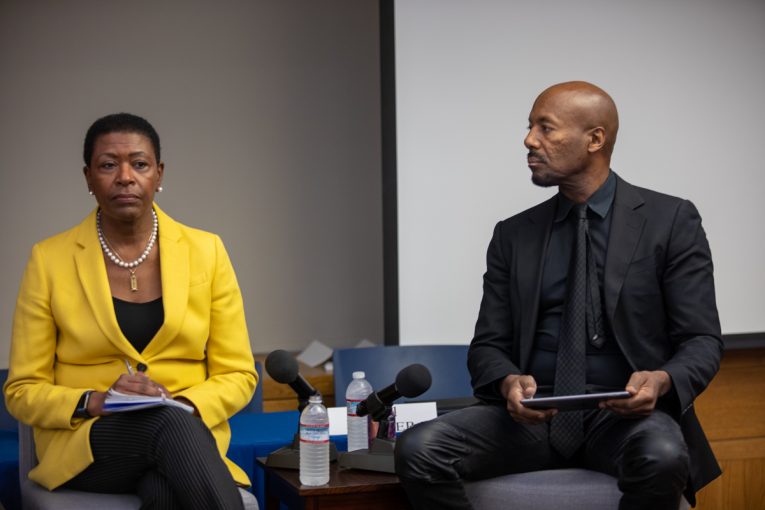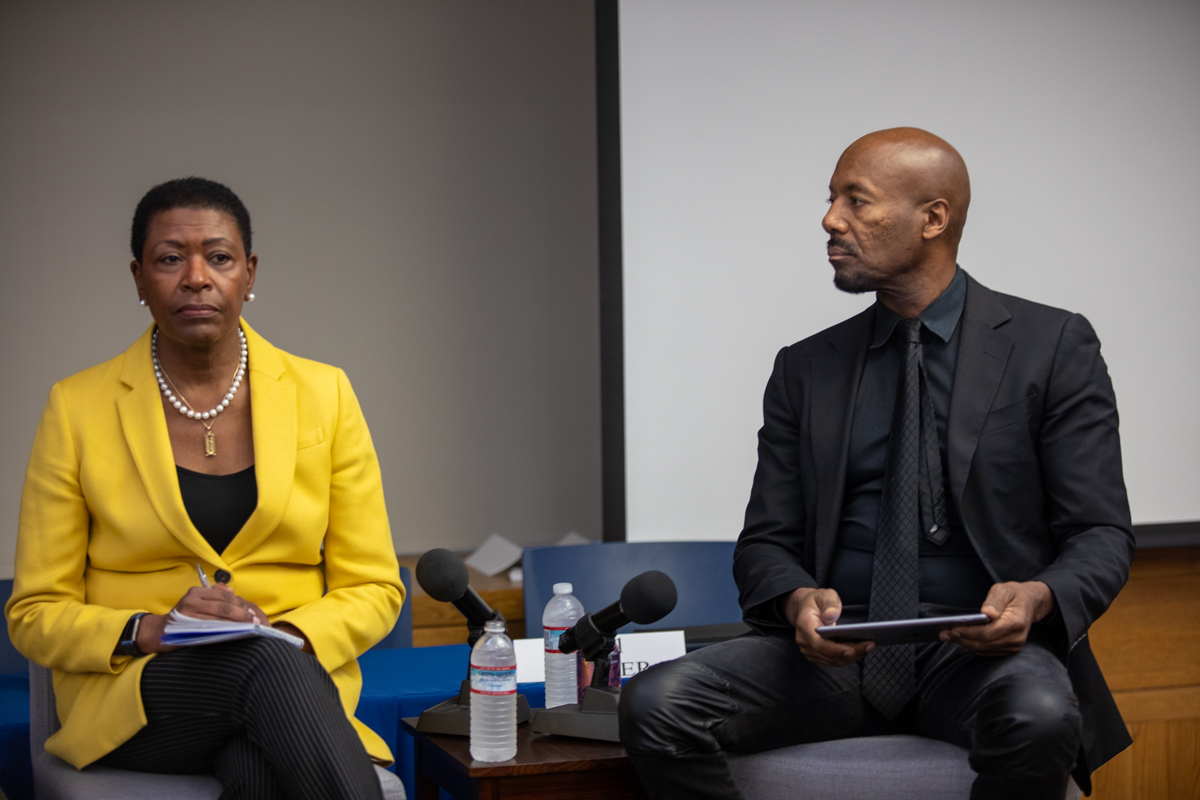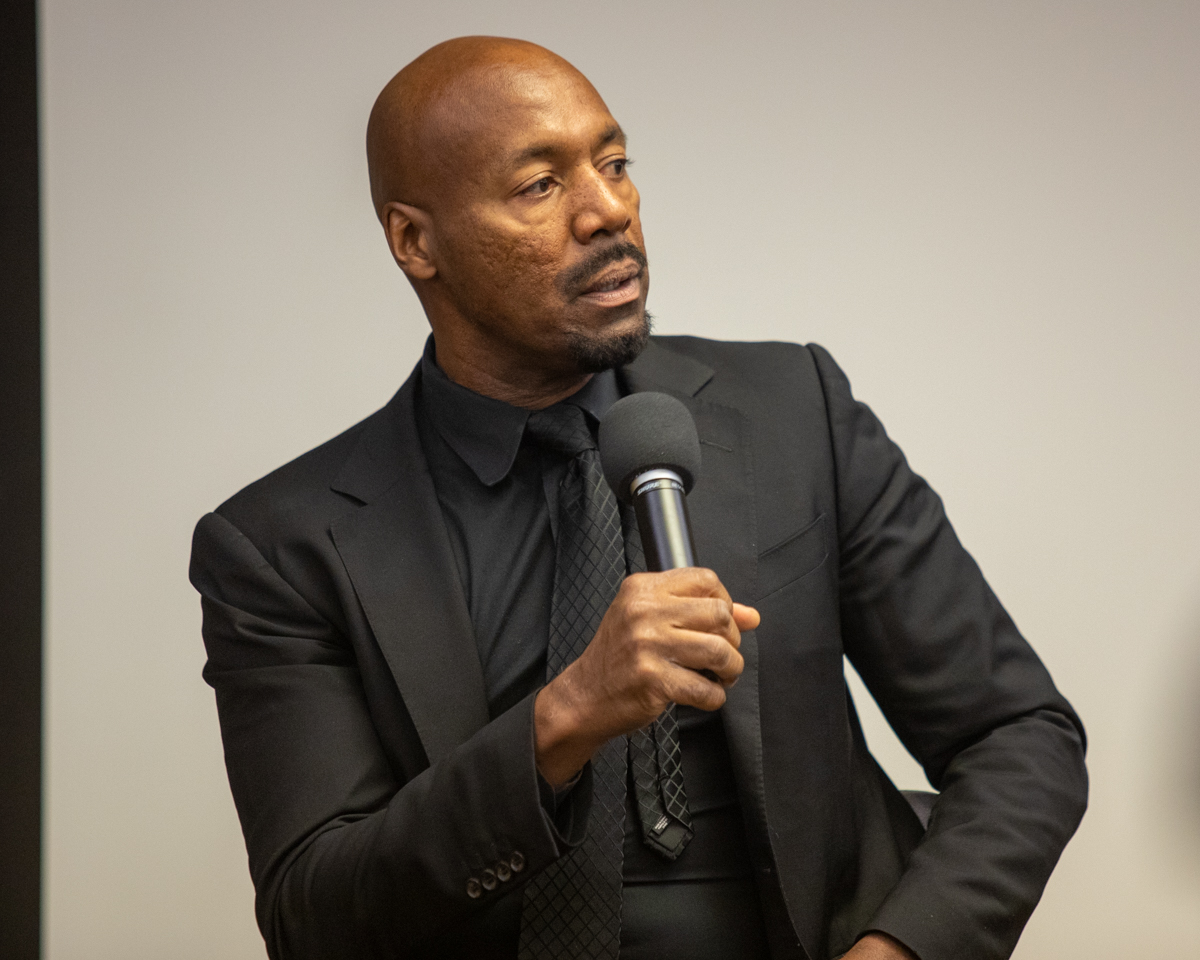

Contra Costa DA Goes from Judge to Prosecutor; Butler Goes from Prosecutor to Professor and Critic
One of the panels during the day-long Progressive Prosecutor Symposium at UC Hastings College of Law featured Contra Costa County DA Diana Becton and Georgetown Law Professor Paul Butler.
Diana Becton had served for 22 years as a judge in Contra Costa County before the Board of Supervisors in 2017 appointed her interim DA, then she was elected DA in 2018. Paul Butler served as a federal prosecutor with the US DOJ before joining the law school, and has become an analyst on MSNBC and a scholar on race and criminal justice. His most recent book is Chokehold: Policing Black Men.
Diana Becton noted that when she was appointed, the previous DA in Contra Costa County was charged with felonies and forced to resign. Her phone started ringing late at night letting her know of the news and that there would be a process to select the next district attorney.
She was asked to consider putting her name in.

“The reasons people thought that I would be good for that position had to do not only with my administrative experience, but also people thought that I would bring criminal justice reform to Contra Costa County,” she explained.
She said, “It was a really a difficult position for me.”
But she noted, “The laws in our criminal justice system really shifted a lot so that judges really didn’t have that much discretion in what happens in the court room.” While a lot of people see judges as the most powerful person in the courtroom, “what I came to see is that it’s really the prosecutor in that courtroom who had all of the discretion and the power.
“Even though there were a lot of things I could do as a judge,” she said. “I really began to feel very disappointed about how things were going, especially as we were looking at the high rates of incarceration as well as all of the disparities in our system. Those things really resonated with me and I thought this would be an opportunity.”
The process was very public – the public made it clear they did not want a backroom deal at the same time, they made it clear that they wanted something very different.
“They had seen the effects of mass incarceration on our community and they wanted someone who would bring change to our community,” Ms. Becton said.

Paul Butler Steals the Show – but Thinks Being a Prosecutor to Change the System is a Mistake
Paul Butler went from being a prosecutor to a professor.
“I’m a recovering prosecutor,” he quipped. “I used to represent the People in criminal court in the District of Columbia and I used that power to put young black men in prison.
“Like many prosecutors, that was pretty much all I did,” he said. “When you go to criminal court in DC, you would think that white people don’t commit crimes.”
He said, “One of the things that I’ve learned is that there are a lot of places like DC.” Take San Francisco, for instance – he said that six percent of the people in the city are black and yet, if you go to criminal court, “you’d be surprised to learn that only six percent of the people who live here are black because 43 percent arrested are African American, 38 percent of the people who get prosecuted are black.”
He told the story of growing up in Chicago, the city Martin Luther King called the most segregated in America. He was riding his bike when a cop pulled alongside him and asked, “Is that your bike?” “Yes. Is that your car?” He said when he got home, his mom gave him a spanking. “Didn’t I know what happened to black boys who talked to cops like that?”
He went into being a prosecutor: “I was hoping I could make a difference from the inside. That’s not what happened. Rather than change the system – the system changed me.
“I became a prosecutor because I don’t like police,” he said. “I stopped being a prosecutor because I don’t like police.”

He said there were two reasons why he left the office. “The first… the obvious racial and in-class character of the work that I was doing. I was locking up poor people. I was locking up people of color.”
He said even if some of those people needed to be locked up, he thought that he didn’t go to law school and make all these sacrifices “to lock up my people.”
The second reason was more dramatic. He was the junior lawyer prosecuting a US senator for public corruption.
“While I was working on that case, I got arrested and prosecuted for a crime that I didn’t commit,” he said.
In the end, “things worked out fine for me.” That was in part “because I hired the best lawyer in the city, a former public defender, an attorney named Michelle Roberts. That was the best decision I made.” He said, “I literally prosecuted people in the courtroom where my trial was held.”
He turned out fine because “I looked like the type of man that they didn’t want to send to prison… Those things shouldn’t have made a difference, but they did.
“The other reason that things turned out fine for me was because I was innocent,” he said. “The more I think about it, that wasn’t the most important reason. I would have rather been guilty and have Michelle Roberts than innocent and have a lawyer who didn’t have the resources to try my case the way it should have been tried.”
He said when he was a prosecutor, he didn’t believe it when the defendants said the cop was lying.
“You mean the officer had nothing better to do than make up stuff about you,” he said he told defendants. “In my trial, the cop took the stand and lied his ass off. I don’t know why he would do that but he did.”
Defendants would say that there are people who know the truth who won’t come forward andm in his case, there were many who did and wouldn’t come forward.
In his 2009 book, he had a chapter that asks, “Should Good People Be Prosecutors?”
He said there are of course good people who are prosecutors. “That was never the problem.” He said, the problem is “it was good people who brought us mass incarceration.” He pointed out, “The people who I worked with as prosecutors were, by and large, liberals, law school graduates, people who wanted to make a difference.”
The way that they tried to fix the problem was to “lock up people and by doing so they thought they were doing the Lord’s work.”
He said that if you want to help victims, maybe being a prosecutor is the way to go.
“I’m not sure it is, but I get the math there,” he said.
However, Professor Butler argued about becoming a prosecutor to help reduce incarceration, to end the New Jim Crow: “I’m not sure being a prosecutor is the most direct way to do that.”
He said, “What prosecutors do is lock people up.” He said, as a prosecutor, “that force is difficult to fight. It’s difficult to fight based on the adversarial system.”
Professor Butler said it was the defense attorney who was supposed to work on behalf of the accused, not prosecutors.
The professor also pointed out that most of the time the politics is focused on locking people up. Every so often, “the politics shifts.” He warned, “The politics is going to shift back. It always does.”
He said about the people who want to use this power to make a difference, “They get frustrated.
“Being a prosecutor because you want to End the New Jim Crow… To me it’s kind of like joining the military because you oppose war,” he said. “It’s kind of like joining the Exxon Valdez because you want to help the environment. I get the argument, I just don’t think it’s the best way.”
—David M. Greenwald reporting
To sign up for our new newsletter – Everyday Injustice – https://tinyurl.com/yyultcf9


“To me it’s kind of like joining the military because you oppose war,” he said. “It’s kind of like joining the Exxon Valdez because you want to help the environment. I get the argument, I just don’t think it’s the best way.”
I found this take fascinating. I believe it is possible to make a positive contribution from any position. If you are the soldier that stops a civilian massacre, being in the military because you oppose war is exactly where you belong. If you are the expert on the Exxon Valdez who prevents a major ecologic tragedy by detecting the problem and stopping the spill, you were where you were meant to be.
The important thing for me is not the venue, but the goal.
It was interesting, I think his experience as a prosecutor embittered him. I’ve read his books and he has interesting insight. But he definitely was soured on the prosecution issue by his experience.
“I believe it is possible to make a positive contribution from any position. If you are the soldier that stops a civilian massacre, being in the military because you oppose war is exactly where you belong. If you are the expert on the Exxon Valdez who prevents a major ecologic tragedy by detecting the problem and stopping the spill, you were where you were meant to be…”
If you oppose war, you will not get into the military unless you lie about your intentions which is of course a crime. The experts on the Exxon Valdez are not there to prevent anything. The only time that their kind of expertise is employed is in the spin of the event for public consumption.
John… one point…
I take personal exception to that, on two levels…
Dad was a college freshman when Dec 8, 1941 happened… he opposed war… he enlisted as a Medic. He was not given a rifle, as he couldn’t shoot the ‘broad side of a barn’, so he was given a 45 to defend himself… he saved lives, on both sides, in the Pacific… not only as a medic, but also, Medics were oft given the responsibility of guarding Japanese prisoners… one time, a bunch of Marines wanted to “have their way with them”, and then kill them… Dad turned his gun on them, and basically indicated, “not on my watch”… they backed down… Dad indicated he never knew if he could have pulled the trigger… but the Marines figured he might be just crazy enough, so they backed off. Dad might have been a good poker player… WAS THAT A CRIME? (your view as to ‘crime’)
I was a college freshman in 1972, turning 18, subject to the draft in the Vietnam war. I resolved that if I was drafted, had to serve, I’d do like Dad… enlist as a Medic (never had been to Canada, a coward’s choice, in my mind). I knew too many of other kids my age, in Jr High, whose Dad’s died there (Vietnam)… I was against war… did my resolution indicate AN INTENT TO COMMIT A CRIME? (your view as to ‘crime’)
I suggest, respectfully, that you narrow your brush… too broad, IMO.
John Hobbs- you missed the point of his comment completely. It doesn’t matter if the system allows. For soldiers or experts on the Valdez to do anything – it’s not the place where difference is going be made.
That said I think Prof. Butler is wrong. Prosecutors have the most discretion in the system – they decide which cases to prosecute and what to charge people with. They have a huge say in the system.
I got that Craig. I agree to a great degree. And I applaud the Prof’s decision and reasoning: “I was hoping I could make a difference from the inside. That’s not what happened. Rather than change the system – the system changed me. I became a prosecutor because I don’t like police,” he said. “I stopped being a prosecutor because I don’t like police.”
He’s not gonna change a thing, neither is Ms. Becton.
And neither are the dupes and puppets of the state who carry on the Sisyphean exercise of appearing to balance the scales.
I can really relate to the story of being on the bike and having a cop ask if it’s my bike. I never would have had the balls to response at Professor Butler did however.
He’s right – police lie on the stand, a lot. White people don’t understand that’s part of where the anger comes from.
Yes Craig, non-white folk, police or not don’t lie as much as white cops on the stand… they are inherently more truthful. Police are inherently less truthful than non-police… got it.
Not.
Wonder if that’s something we can quantify and analyze
I have serious doubts… to how we can get to pure, factual truth, given lack of witness reliability, lack of forensic certainty, implied/inherent bias, etc., etc.
Which, you have pointed out, are all “concerns”…
“I wonder”, indeed… reminds me of another who often “wonders”…
Ever noticed how a single keystroke can change “wonder” to “wander” (on purpose, or dumb-thumbing)? Just a change in two vowels… I wonder… and wander off-topic… or do I, as you opened a door… or a rabbit hole? Guess we should ask “Alice”… who did both.
Quantify lies? Good luck with that.
Sincerely,
God
Laquan McDonald. Walter Scott. With the advent of body cameras, we can probably now come up with an estimate.
Again with the the indentation privileged. You belief that lies can be quantified is as laughable as “fact check”.
I think you’re mistaking the notion of quantifying – which means analyzing with numbers with having completely accurate data. To some extent, I think such things are always going to be underreported, just as I think wrongful convictions are. But that doesn’t mean that attempts to measure and estimate it are fruitless nor is studying that data for trends and patterns even if it is admittedly incomplete.
That is a most excellent reply.
The real problem is juries who believe cops never lie. I’ve been on / witnessed two jury trials in Yolo County, and I was astounded by a particular class of people — and much as I don’t like to, I’m gonna bring race into it: old white simpletons. These people seemed to make up over half the people on these juries — old white people who think cops never lie, and just wanted to take a vote and go home, because it was obvious to them the defendant was guilty, cuz the cop said so, so why deliberate?
I’ve told the tales a couple of times here. No I’m not anti-cop nor a progressive justice reformer — I’m just amazed by people who are so black and white in their beliefs (pardon the two or three puns in there). It’s someone’s life, so let’s vote guilty and go home. I’m sure you all have in mind a picture of exactly the type of people I mean. WTF.
That was more true pre-2014 than post-2014. The thing about cases like Walter Scott and Laquan McDonald is that the public saw on video, indisputable evidence that cops lie. And it punctured that myth. So we have seen a lot of juries post-2014 that have been much more skeptical of claims by cops than we ever saw before these incidents started happening.
Good point, and I agree, and I think this is a very positive advance – despite all the issues with videos – it certainly has broken the ‘myth’.
I also hope some of those people I sat with on juries have “passed on”, either to not being so believing of ‘cops only’, or to that great white light in the sky.
Aye, there’s the rub… definition/determination of “completely accurate”, is inherently a subjective process… videos can be altered/edited. Gets to ‘chain of custody’…
Then there is the analyzing of data, however accurate… another subjective process. Two folk, with different “bents” can take the exact, same “accurate data”, and end up with disparate conclusions.
David… you question witness identification, finger prints, expert witnesses… impartial analysis of completely accurate data? Glad someone still absolutely believes in Santa, Easter Bunny, Tooth Fairy…
The human condition is limited…
The criminal justice system has been too slow to recognize its own limitations. That comes at an extremely high cost.